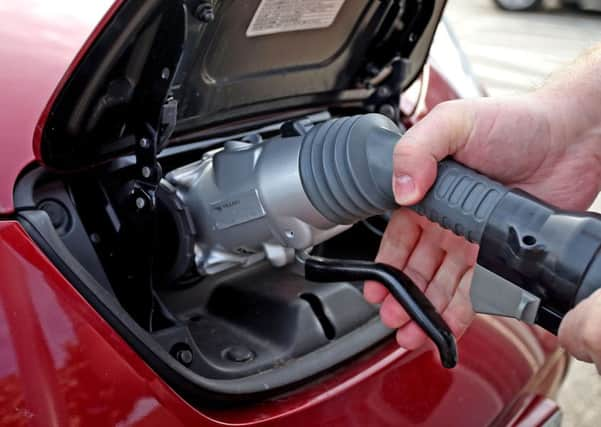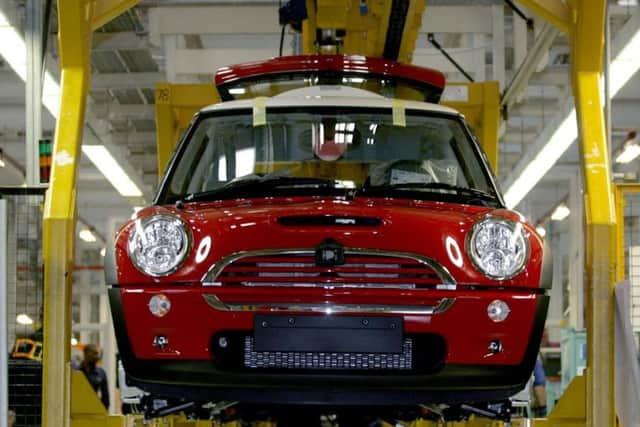Government ban on petrol and diesel cars '˜pie in the sky': Wilson


That is the view of former environment minister Sammy Wilson, the DUP MP for East Antrim, reacting to a new strategy published by the government on Wednesday.
The plan to end sales of new conventional diesel or petrol cars by 2040, unveiled yesterday, is aimed mainly at curbing levels of NO2 (nitrogen dioxide).
NO2 is caused by, among other things, road traffic.
Advertisement
Hide AdAdvertisement
Hide Ad

The news has been welcomed by groups including the Northern Irish branch of the Green Party, which pointed out that air pollution can worsen respiratory health.
Exposure to high levels of NO2 can irritate airways, worsening (or even causing) asthma – with children and the elderly at greatest risk.
The government said that, as far back as 2011, the UK had announced it was pursuing the “intention” of ending sales of such cars and vans by 2040.
However, yesterday’s declaration struck a more definitive tone, and stated: “The government confirmed today that it will end the sale of all new conventional petrol and diesel cars by 2040.”


It is unclear whether the ban also applies to vans.
Advertisement
Hide AdAdvertisement
Hide AdIn addition, the 103-page report accompanying yesterday’s announcement makes no mention of tractors or other farm vehicles.
The government said ultimately it wants “nearly every car and van on UK roads to be zero emission by 2050”.
Mr Wilson said a range of things – not just private cars – contribute to NO2, adding: “Why target car owners again? It’s because they’re an easy touch.”
He went on to voice concern that councils could opt to financially penalise motorists for driving fossil fuel-powered cars in the years ahead.
Advertisement
Hide AdAdvertisement
Hide AdHe went on: “This idea that we could move to all electric cars by 2040 I think is just pie in the sky.
“Do we have the infrastructure to produce the electricity? The answer is no. You’d require considerable investment in it.
“Even in people’s houses, they’d probably need to have fast charging for three or four cars as many houses have, which’d require a total rewiring of the house.
“And anyway – what do you produce electricity from? We’d certainly not produce that amount of electricity by wind.”
Advertisement
Hide AdAdvertisement
Hide AdGreen Party leader Steven Agnew, MLA for North Down, said of the announcement: “Around 500 people die in Northern Ireland every year from respiratory conditions linked to poor air quality.
“The number of diesel and petrol cars on our roads is known to be a major contributor to air pollution levels.
“The ban on petrol and diesel cars from 2040 will force government to provide the infrastructure that will support electric cars on our roads.”
Yesterday’s announcement came jointly from Westminster’s Department for Environment, Food & Rural Affairs (DEFRA) and the Department for Transport.
Advertisement
Hide AdAdvertisement
Hide AdSince air pollution is a devolved matter, DEFRA was asked if Northern Ireland may be able to opt out of the planned end to selling fossil fuel cars by 2040.
It responded: “It’s a national plan, and it is our ambition to end all sales of new petrol and diesel vehicles by 2040.”
Meanwhile, Northern Ireland’s own Department of Agriculture, Environment and Rural Affairs said: “We are awaiting further details on this proposal before being in a position to determine its impact or potential implementation in Northern Ireland.”
Government plans also include looking at bringing in a “targeted scrappage scheme” focused on drivers who need most support, and £255m to help councils come up with ways to improve air quality.
HOW BAD IS NI ROAD POLLUTION?
Advertisement
Hide AdAdvertisement
Hide AdOut of the whole UK, Northern Ireland appears to fare well in terms of NO2 pollution, relatively speaking.
The 103-page detailed plan at the heart of Wednesday’s announcement states that “Northern Ireland’s geography and maritime position ensure it has a steady supply of good air”.
Nevertheless, it adds that “NO2 pollution from road traffic is a significant problem”.
The data in the report reveals the worst annual average concentration of NO2 estimated on any stretch of road in Northern Ireland this year looks set to be 36μg/m3 (that is, 36 micrograms per cubic metre of air).
The maximum limit is supposed to be 40μg/m3.
Advertisement
Hide AdAdvertisement
Hide AdThis Northern Irish figure is way below the worst in the UK – namely greater London, where the worst site is projected to experience readings of 97µg/m3 – and is in fact among the lowest half-dozen in the UK as a whole.
What is more, even without the planned phasing out of diesel and petrol cars, the worst annual average concentration of NO2 which any site in Northern Ireland is expected to experience is predicted to fall to 18 μg/m3 by 2030.
In other words, it will have dropped to half the current level on its own, 10 years before the last new fossil fuel car is sold in the Province under the current plans.